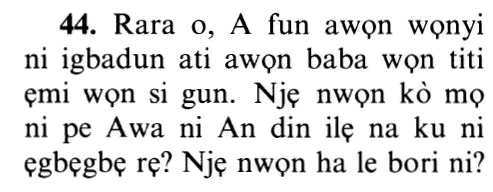21vs44
Select any filter and click on Go! to see results
بَلْ مَتَّعْنَا هَؤُلَاء وَآبَاءهُمْ حَتَّى طَالَ عَلَيْهِمُ الْعُمُرُ أَفَلَا يَرَوْنَ أَنَّا نَأْتِي الْأَرْضَ نَنقُصُهَا مِنْ أَطْرَافِهَا أَفَهُمُ الْغَالِبُونَ
Bal mattaAAna haolai waabaahum hatta tala AAalayhimu alAAumuru afala yarawna anna natee alarda nanqusuha min atrafiha afahumu alghaliboona
Yoruba Translation

Hausa Translation
ôa, Mun yalwata wa waɗannan da ubanninsu ni´imarMu, har rãyuwa ta yi tsawo a kansu. Shin, to, bã su ganin cħwa lalle Mũ, Munã je wa ƙasarsu, Munã rage(3) ta daga sãsanninta? Shin, to, su ne marinjaya?
Asbabu n-Nuzuul (Occasions of Revelation)
How the Idolators are deceived by their long and luxurious Lives in this World, and the Explanation of the Truth
Allah tells:
بَلْ مَتَّعْنَا هَؤُلَاء وَآبَاءهُمْ حَتَّى طَالَ عَلَيْهِمُ الْعُمُرُ ...
Nay, We gave the luxuries of this life to these men and their fathers until the period grew long for them.
Allah explains that they have been deceived and misled by the luxuries that they enjoy in this world and the long life that they have been given, so they believe that they are following something good.
Then Allah warns them:
... أَفَلَا يَرَوْنَ أَنَّا نَأْتِي الْأَرْضَ نَنقُصُهَا مِنْ أَطْرَافِهَا ...
See they not that We gradually reduce the land (in their control) from its outlying borders!
This is like the Ayah:
وَلَقَدْ أَهْلَكْنَا مَا حَوْلَكُمْ مِّنَ الْقُرَى وَصَرَّفْنَا الاٌّيَـتِ لَعَلَّهُمْ يَرْجِعُونَ
And indeed We have destroyed towns round about you, and We have shown the Ayat in various ways that they might return. (46:27)
Al-Hasan Al-Basri said:
"This means the victory of Islam over disbelief.''
The meaning is: Do they not learn a lesson from the fact that Allah supported those (believers) against their enemies, He destroyed the disbelieving nations and the evil-doing townships, and He saved His believing servants.
So Allah says:
... أَفَهُمُ الْغَالِبُونَ ﴿٤٤﴾
Is it then they who will overcome!
meaning, on the contrary, they are the ones who will be overcome, who will be defeated, humiliated and brought low.
يقول تعالى مخبرا عن المشركين إنما غرهم وحملهم على ما هم فيه من الضلال أنهم متعوا في الحياة الدنيا ونعموا وطال عليهم العمر فيما هم فيه فاعتقدوا أنهم على شيء ثم قال واعظا لهم " أفلا يرون أنا نأتي الأرض ننقصها من أطرافها " اختلف المفسرون في معناه وقد أسلفناه في سورة الرعد وأحسن ما فسر بقوله تعالى " ولقد أهلكنا ما حولكم من القرى وصرفنا الآيات لعلهم يرجعون " وقال الحسن البصري يعني بذلك ظهور الإسلام على الكفر والمعنى أفلا يعتبرون بنصر الله لأوليائه على أعدائه وإهلاكه الأمم المكذبة والقرى الظالمة وإنجائه لعباده المؤمنين ولهذا قال " أفهم الغالبون " يعني بل هم المغلوبون الأسفلون الأخسرون الأرذلون .
"بل متعنا هؤلاء وآباءهم" بما أنعمنا عليهم "حتى طال عليهم العمر" فاغتروا بذلك "أفلا يرون أنا نأتي الأرض" نقصد أرضهم "ننقصها من أطرافها" بالفتح على النبي "أفهم الغالبون" لا بل النبي وأصحابه
قال ابن عباس : يريد أهل مكة . أي بسطنا لهم ولآبائهم في نعيمها
I'raab - grammatical analysis of the Qur'an
«بَلْ» حرف إضراب «مَتَّعْنا» ماض وفاعله «هؤُلاءِ» الها للتنبيه أولاء اسم إشارة في محل نصب مفعول به «وَآباءَهُمْ» الواو عاطفة «آباءَهُمْ» معطوف على هؤلاء والهاء مضاف إليه والجملة مستأنفة «حَتَّى» حرف غاية وجر «طالَ» ماض «عَلَيْهِمُ» متعلقان بطال «الْعُمُرُ» فاعل «أَفَلا» الهمزة للاستفهام والفاء عاطفة «لا» نافية «يَرَوْنَ» مضارع وفاعله «أَنَّا» أن حرف مشبه بالفعل ونا اسمها وأصلها أننا فأدغمت النونان «نَأْتِي» مضارع والفاعل مستتر «الْأَرْضَ» مفعول به وأنّا وما بعدها سدت مسد مفعولي يرون
نَنْقُصُها» مضارع ومفعوله وفاعله مستتر تقديره نحن «مِنْ أَطْرافِها» متعلقان بننقصها والجملة حالية «أَفَهُمُ» الهمزة للاستفهام والفاء حرف عطف «هم» مبتدأ «الْغالِبُونَ» خبر والجملة مستأنفة
